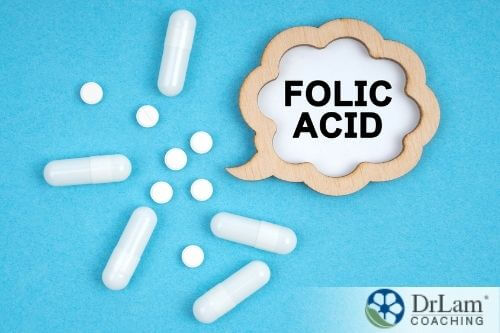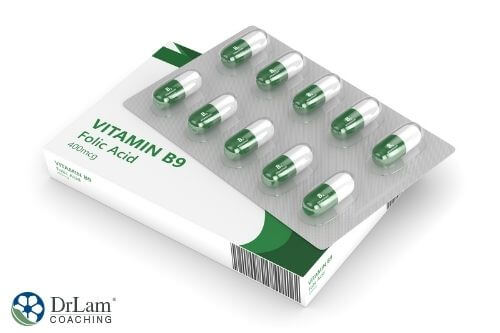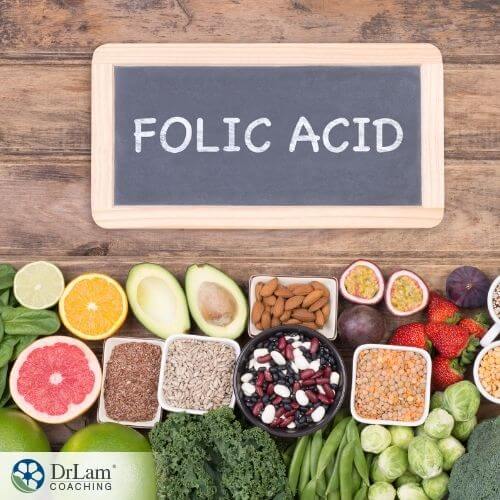Folic acid is the synthetic version of folate, which is an essential B vitamin. Essential nutrients are those your body can't make on its own. That means that you need to get it through food or supplementation. Whole food contains naturally occurring folate, while some types of processed food are fortified with folic acid. Folic acid also comes as a supplement. In this article, we’ll talk about folic acid benefits as well as precautions.
 First, let’s talk about folate and how to get it from food.
First, let’s talk about folate and how to get it from food.
Folate is vitamin B9. It’s a water-soluble vitamin that's involved cell division and tissue growth. Along with folic acid, it’s mostly known for how important it is during pregnancy for healthy fetal development. The discovery of its importance during pregnancy helped reduce the risk of birth defects, including neural tube defects such as spina bifida.
But a folate deficiency doesn't just affect fetal development; it affects adults too. For example, folate deficiency can lead to pernicious anemia as well as neuropsychiatric problems. Some studies have correlated folate deficiency with depression, dementia, and cognitive decline in vulnerable populations. And, because folate deficiency often comes with B12 deficiency, you can also count B12 deficiency issues as part of the problem here as well.
Thankfully, you don’t need a high dose of folate to avoid these problems. 400 micrograms per day is usually enough, and that can be obtained from food easily enough.
Folate-rich foods include:
Although some people use the terms folic acid and folate interchangeably, they are not the same thing. Folic acid is human-made, and therefore cannot be found naturally occurring in food. But there are some foods that are fortified with folic acid to try to help people meet their daily requirements via their diet.
Some of these fortified foods include certain types of bread, pasta, cereal, oatmeal, cornmeal, rice, noodles, and even some types of tortillas and chips.
However, this fortification differs between brands and also between different countries. So you’ll need to check the nutrition label on your food to know whether it is fortified, and if so, how much folic acid it contains.
For all intents and purposes, folic acid benefits are pretty much the same as those of folate. But there is debate about whether folic acid is more or less bioavailable than folate. Some studies show that folic acid in fortified foods is more easily absorbed by the body than naturally occurring folate in whole food. Other studies showed that the body actually has a harder time metabolizing folic acid and so it can accumulate in the system more quickly.
These details may be important to take into consideration, especially if you have slowed or congested detoxification or are at risk of chronic inflammation. It's also something you'll need to discuss with your healthcare professional.
But for most people, getting naturally occurring folate from whole foods and combining that with some folic acid from fortified foods should do the trick. It covers the basic requirements and also utilizes the bioavailability of the two different sources.
Because folate and folic acid have different levels of absorbability, we need to take that into account for calculating their dosage. That’s why we use DFEs: daily folate equivalents. It’s calculated as 1 mcg of naturally occurring folate being equivalent to 0.5 mcg of folic acid taken on an empty stomach or 0.6 mcg taken with food. Each of those is counted as 1 mcg of DFE. People in different stages of life, as well as with different health conditions, will require different DFEs.
As stated earlier, most healthy adults require around 400 mcg of DFEs a day. But pregnant and breastfeeding women need between 500 to 800 mcg of DFEs a day.
For pregnant women, supplementing with folic acid is not only a good idea, but necessary. In fact, prenatal multivitamins should be started before conception if possible. But even if you get pregnant without having started supplementation, you should start as soon as possible. The earlier you supplement the better. Actually, the main reason the campaign to fortify certain staple foods with folic acid exists is to reduce the risk of neural tube defects during fetal development. This is how important folic acid benefits are during pregnancy.
For babies and children, the recommended DFEs increase from 65 mcg to 300 mcg. By around age 14, they need the full adult dose of 400 mcg. This can be done through diet as well, and does not necessarily require a supplement.
But folic acid benefits are not restricted to healthy people and the daily recommended dosages. Higher doses can help those with deficiencies as well as those with specific conditions.
 Any supplement, in general, should be used for one of two reasons: as a therapeutic boost or as a nutritional gap filler. With the latter, even some of the most well-planned diets will have some nutritional gaps here and there, and taking a supplement for that gap rounds out the diet well. As a nutritional gap filler, a small dose is usually enough. If you plan out your diet to include some folate-rich whole foods and folic acid fortified foods, then you’ll likely only need very little, if at all.
Any supplement, in general, should be used for one of two reasons: as a therapeutic boost or as a nutritional gap filler. With the latter, even some of the most well-planned diets will have some nutritional gaps here and there, and taking a supplement for that gap rounds out the diet well. As a nutritional gap filler, a small dose is usually enough. If you plan out your diet to include some folate-rich whole foods and folic acid fortified foods, then you’ll likely only need very little, if at all.
A therapeutic boost, on the other hand, can help you get over certain recovery humps. You can also use it to avoid certain deficiency risks, then taper down the dosage after.
Folic acid supplements can be helpful in reducing elevated homocysteine levels in the blood. Elevated levels are linked to cardiovascular issues such as heart disease and stroke. This is especially useful if you have kidney problems, as those can raise your homocysteine levels and your risk for heart disease. Also, even without a link to homocysteine, supplements may also help reduce your risk for stroke, especially if you do not consume or don’t have access to fortified foods.
To a lesser extent, folic acid might also help reduce high blood pressure. People with Adrenal Fatigue Syndrome (AFS) and stress response dysregulation may suffer from blood pressure instability. This is due to several factors, including the way cortisol affects blood pressure and also how the cardiovascular system is involved in the body’s global stress response.
Your NeuroEndoMetabolic (NEM) Stress Response is your body’s global response to stress. It’s composed of six circuits of organs and systems that work together to fight stress. They are the Hormone, the Bioenergetics, the Cardionomic, the Neuroaffect, the Inflammation, and the Detoxification circuits. Your adrenal glands, which produce cortisol, are part of your Hormone Circuit. And cortisol is your body’s main anti-stress hormone.
If you have a folate deficiency, elevated homocysteine levels, or any other clinical or sub-clinical condition, that’s a form of stress. So your NEM and your adrenals will have to work to offset the effects of that stress. The problem is that sometimes you don’t know what’s going on so the stress continues and ends up overworking your stress response.
That’s when you can get adrenal fatigue, whose symptoms include fatigue, weight gain, sleep disturbances, brain fog, anxiety, mild depression, hypoglycemia, lowered immunity, low libido, PMS, infertility, food and drug sensitivities, unstable blood pressure, and an inability to handle stress.
Unfortunately, taking a supplement to reduce the effects of the deficiency or even to lower homocysteine levels is not as straightforward as it sounds. With advanced AFS, your body may not react well to supplements, especially in high doses. And you can end up with a paradoxical reaction or even an adrenal crash. That’s why, whenever we talk about supplements, we have to warn that it’s not something we can generalize to everybody.
When we work with clients, we take into account their unique condition and needs, and we customize the supplementation protocol accordingly. Even though there are many folic acid benefits, they may not be right for you in your specific situation. So getting the right kind of guidance is key to recovery, including from deficiency.
 Folic acid supplementation is critical during pregnancy to avoid neural tube defects. But even for adults, there are folic acid benefits for your brain health and mental health.
Folic acid supplementation is critical during pregnancy to avoid neural tube defects. But even for adults, there are folic acid benefits for your brain health and mental health.
For example, it may help improve memory and focus in those with age-related cognitive decline that is a little more severe than the norm. It may also help with reducing some of the symptoms of Alzheimer’s disease.
As for mental health, some studies have shown that it may be effective in reducing depression when taken with anti-depressants or as an adjunct to other therapies.
But, if you have brain fog and mental health issues related to AFS, you may not actually need a folic acid supplement. Your adrenal fatigue recovery program may or may not include it. Once your adrenal fatigue clears, so will those issues. They are temporary problems that stem from chronic stress, whether physical or emotional, rather than from a deficiency per se.
Folic acid may be useful in counteracting some side-effects of certain medications, mainly methotrexate and phenytoin.
Methotrexate is an antimetabolite drug. It suppresses the immune system and also slows down cancer cell growth. It’s usually used for treating certain cancers, rheumatoid arthritis, and bad cases of psoriasis. Some of its side-effects that folic acid supplementation can help with are nausea and vomiting.
Phenytoin is an epilepsy drug. Folic acid benefits here include reducing the gum enlargement it can cause. However, in this case, folic acid would have to be applied topically to your gums.
Folate is important for a woman’s fertility. It helps maintain the quality of oocytes as well as for the process of implantation and maturation of the eggs. Some studies also showed that taking a higher dose of folate, such as 800 mcg and above, may help women using assisted reproductive technology to conceive more easily.
Acute inflammation, that comes and goes, is a normal and healthy part of your immune response. But chronic inflammation, that persists long-term, is one of the biggest causes of chronic conditions as well as adrenal fatigue and NEM dysregulation. Folic acid might help reduce inflammation. This makes it a useful possible supplement to include in an anti-inflammatory diet and supplementation program. It has been shown to reduce inflammatory markers like c-reactive protein.
Stable blood sugar levels are one of the cornerstones of good health. Unfortunately, with AFS, we see a lot of blood sugar instability. Spikes and crashes are common. This then creates vicious cycles that can lead to metabolic dysregulation, more stress, and even diabetes.
Folic acid might help with blood sugar control as well as insulin resistance. And because it might be helpful in reducing heart disease and stroke risks, which are much higher in those with diabetes, it could therefore reduce diabetes complications in that way.
 Folate is an essential nutrient your body needs to function. It is especially important for pregnant women to take in order to avoid fetal defects. But other people can benefit as well, including those with adrenal fatigue and NEM dysregulation. The question is not whether or not folic acid is a good supplement. The question is whether you need it and would benefit from it. And if so, for how long and in how big of a dose.
Folate is an essential nutrient your body needs to function. It is especially important for pregnant women to take in order to avoid fetal defects. But other people can benefit as well, including those with adrenal fatigue and NEM dysregulation. The question is not whether or not folic acid is a good supplement. The question is whether you need it and would benefit from it. And if so, for how long and in how big of a dose.
If you’d like to talk to one of our coaches about folic acid, supplements in general, or about what recovery program might benefit you, you can call us for a free consultation at +1 (626) 571-1234 or click here for our Ask the Doctor system.
Folic acid benefits include healthy fetal development, blood pressure stability, reducing inflammation, decreasing heart disease risks, and even helping to manage diabetes. But that doesn’t mean you should reach for the highest dose immediately. You need to customize your supplementation to your specific needs.
